Christianity
Christianity isn't a failure; it simply hasn't been tried yet. (G K Chesterton)
The Christian life is a life of grace. (p51, Merton's Paradise Journey)
Just as Jesus counted on his human disciples to spread the Gospel, God counts on us to be his hands and feet in the world - to be the body of Christ. (p20) Become a co-creator. (p89, Healing the Divide) God needs us as much as we need God. (p88)
Christ could be born a thousand tines in Galilee - but all in vain until He is born in me. (p90, Healing the Divide)
Christians are to be light that illuminates truth, yeast, and salt that gives flavor and nutrition. (Rohr)
The Trinity

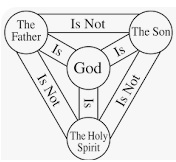
The Trinity might be about process rather than persons.8,p15 Affirming, denying, and reconciling are roles, not identities.8,p29
A ternary system is the interplay of the two polarities which calls forth a third, which is the 'mediating' or 'reconciling' principle between them. It generates a synthesis at a whole new level.8,p16
Denying (2nd force) is never an obstacle to be overcome but always a legiimate and essential component of the new manifestation.8,p29No resistance, no new arising.8,p39
The 3rd force is an inbreaking of a higher order of reality (grace) that opens a person's eyes to the 3rd force that is actually there already but hidden.8,p32
Einstein said 'a problem can never be solved at the same level at which it is created.' The 3rd force is invisible to human beings in the ordinary state of consciousness in which they live. Detection of 3rd force requires a finely developed sense of both/and. The midwife is our conscious attention.8,p44-5
A ternary sysyem has inherent aptitude for dynamism, change, and process.8,p65
Along with a tendency to regard matter as the primary source of our human exile comes the tendency to identify God with the top of the great chain of being only, not with the whole chain.8,p70This tendency clashes that in Jesus, God had drawn very close and 'became flesh and dwelt among us.' Things do not lose spirit simply because they inhabit form. The way to God is not up, but down. Form seems to be the chief operative in making the fullness of the divine manifestation happen.8,p72-4
Being is a verb, not a substance, and the Trinity is the indivisible expression of the mode of this beingness.8,p85
The universe itself is not only created, but creative; it bears the capacity to be a 'self-creating world.' Threefoldness breaks symmetry and lets the differences interact.8,p88The visible universe must be seen not as an artifact, but as an ongoing dynamism.8,p102The Trinity is a dynamic template of divine love stamped into into a self-creating world.8,p128
Augustine's vision of Spirit as the love between the Father and the Son collapses the Trinity back into ditheism - a closed circle and disarms the 'new arising.' Three forces must be independent and equal and their interwining must necessarily result in a new arising.8,p91
Living consciously in the Law of Three is the key to unlock the tresure-house of Christian mystically Wisdom and harness the energy of love.8,92
That Oneness must first project itself into twoness in order for anything to come into being. But having undegone that initial separation, it must then bridge the gap.8,p114
The Holy Spirit is the bond between the Father and the Son. The Spirit is the mystery which ensures that the Father and the Son do not become two Gods, but remain one God.11,p54
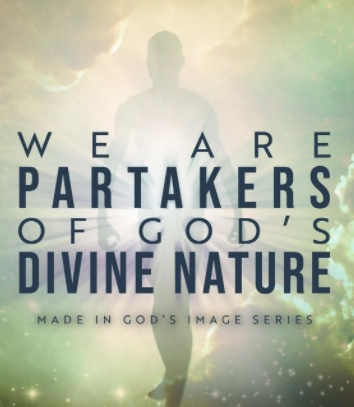
The Trinitarian Persons are not content with merely relating, they want to UNITE. Oneness emerging into multiplicity, multiplicity returning to oneness.11,p56
Christians believe that God is formlessness (the Father), God is form (the Son), and God is the very living and loving energy between those two (the Holy Spirit). Our dualistic minds largely shelved the whole thing because we simply couldn’t understand it. The Trinity reveals God more as a verb than a noun, but we rarely speak about God that way in either our preaching or our prayers. God is three “relations,” which itself is mind-boggling for most believers. Yet that clarification opens up an honest notion of God as Mystery who can never be fully comprehended with our rational minds. God is dynamic—a verb rather than a static name. Everything is in relationship and nothing stands alone. The doctrine of the Trinity defeats the dualistic mind and invites us into nondual, holistic consciousness. God is a “circular” rotation (perichoresis) of total outpouring and perfect receiving among three intimate partners. (Rohr)
When we try to understand Jesus outside the dynamism of the Trinity, we do not do him or ourselves any favors. Jesus never operated as an independent “I” but only as a “thou” in relationship to his Father and the Holy Spirit. We had thought our form was merely human, but Jesus came to show us that our actual form is human-divine, just as he is. He was not much interested in proclaiming himself the exclusive son of God. Instead, he went out of his way to communicate an inclusive sonship and daughterhood to the crowds. Paul uses words like “adopted” (Galatians 4:5) and “co-heirs with Christ” (Romans 8:17) to make the same point. “Full and final participation” was learned from Jesus, who clearly believed that God does not so much promise us a distant heaven but invites us into the Godself as friends and co-participants.(Rohr)
Shifting Trinity from language of being and person to a concept of God as Love can help counteract this tendency to make God in our own image. The primary analogy for God as Trinity offered [here] is Source of Love, Word of Love, and Spirit of Love. God the Father is the Unoriginate Source of Love. God's unfolding of Love empowers us to participate in the unfolding of that Love in the world. Through that meditative prayer, we will come to better enact Love in the world.(Rohr)
It is formally incorrect to say “Jesus is God,” as most Christians glibly do. For Christians, the Trinity is God, and Jesus is a third something—the union of “very God” with “very human.” This dynamic unity makes Jesus the Exemplar of our faith. Our true and deep need is to experience the same unitive mystery in ourselves and in all of creation. This is how Jesus “saves” us and what salvation finally means. The spiritual and the material are one. Early Christians mystically saw that Jesus is the union of human and divine in space and time, and the Christ is the eternal union of matter and Spirit beyond time. But the later centuries tended to lose this mystical element in favor of dualistic Christianity. We lost our foundational paradigm for connecting all opposites. But for more and more people, union with the divine is first experienced through “the Universal Christ”—in nature, in moments of pure love, silence, inner or outer music, with animals, or a primal sense of awe. Why? Because creation itself is the first incarnation of Christ, the primary and foundational “Bible” that reveals the path to God. (Rohr)
God for us, we call you Father. God alongside us, we call you Jesus. God within us, we call you Holy Spirit. God for us is my understanding of, and code word for, the Father. It tells us that reality is foundationally benevolent. Reality is on our side. It’s not a scary universe. It tells us that God, like a good father, is for us and is protective of us.(Rohr)
The universe is benevolent in evolutionary change driven by love. God is the name of personal divine love emerging in evolution. Evolution reveals a newness to God because love is always expressing itself in new patterns of relationships. The dynamic fountain fullness of divine love means forever the newness of world; God is ever newness in love, and thus the world is ever new as well. There is no doubt that suffering and violence abound in the crevices of life, but suffering is not a punishment of a vengeful God. God does not abandon us; we abandon God by . . . running after little gods. God lives deep within us, as the center of love, but we are often [dismissive of] this inner center and drawn by the little gods of power, success, status, and wealth, everything we create for ourselves. The theodicy question is not why God allows bad things to happen to good people but why we abandon God in the face of suffering. If God is love, then our only real hope is in God, because hope is the openness of love to infinite possibilities and new life. Jesus knew of the deeper truth hidden beneath the surface of human judgment, namely that this broken, anxious world is oozing with God.(Rohr)
Spiritual life should be centered on God, in Christ. (p86, The Way of Paradox)
Jesus is the Son of God, whereas mankind are sons/children of God.
Not 1+1+1=3, but 1x1x1=1
I am a father, a son and a husband at one and the same time. Yet I am only one person. Perhaps a more biblical approach is to consider that a husband and wife are two persons yet in God's eyes they are "one flesh." Add children and then you have the family as a miniature (and very imperfect) version of the Trinity. Matter = mass + energy + motion; Space = length + height + breadth; Time = past + present + future. Thus the whole universe witnesses to the character of the God who made it. (christianity.com)
Creation as Very Good

Satan, the force of fragmentation, is the crucial element required for creation because without it everything would unite with God - everything would become one.3,43
We Franciscans believe that the first coming of “the Christ” is in creation itself. God’s “first idea” and priority was to make the Godself both visible and shareable. The word used in the Bible for this idea was Logos, which I would translate as the “Blueprint” or Primordial Pattern for reality. Everything is the “child of God”—not only Jesus.(Rohr,12/6/20)
God saw all that he had made, and it was very good. (Gen 1:31)
The transcendentals (Latin: "to exceed") are the properties of being, nowadays commonly considered to be truth, beauty, and goodness. From a cognitive point of view, they are the "first" concepts, since they cannot be logically traced back to something preceding them. (Wikipedia)
The Garden and the Fall from Grace
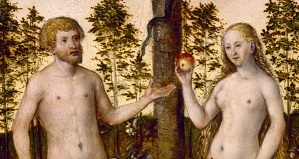
The Perennial Tradition does not believe in original sin, but original blessing?
Death (from eating from the tree of knowledge) is not a punishment, but the reality of a creation that has duality.3,p248
Life is not an 'either-or' proposition; it always includes the spirit of 'and'.3,p250
The Fall brought sin into the world, a state from which they cannot attain eternal life without the grace of God.(Wikipedia)
At birth our separated self suddennly means we live our lives 'east of Eden' in a state of separation and estrangement. We grow into a false self identity conferred by the world and our culture. (p232, Days of Awe and Wonder)
Job trusts that this journey with God will continue even after death. Love of God and eternal life are beginning to become the same thing.(Rohr)
The Fall was a fall from unity and harmony into a condition of separateness and alienation and willful acceptance of unreality and illusion. (p3, Merton's Paradise Journey).
False, Misleading, Incomplete, or Controversial Beliefs
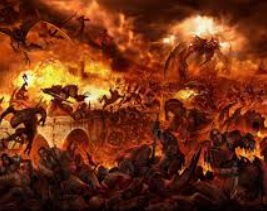
See above 'Fall from Grace"
Original Sin:
Christianity pushed the problem of separation (“original sin”) instead of beginning with the wonderful unity between creation and Creator. Holiness” largely became a matter of intellect and will, instead of a deep inner trust with an inner dialogue of Love. We’ve been gazing at our own “performance” instead of searching for the Divine in us and in all things. (Rohr)
Not original sin, but original blessing.
We’re exiled from the generosity of God pouring God’s self out as life itself. This is the meaning of “original sin,” but not as a blight against the soul. Rather, it means we’re exiled from the divinity of every breath and heartbeat, because to taste the divinity of every breath and heartbeat means fear has no foundations. (Rohr)
Regularly experience war, famine, torture, families separated by death or distance, relentless injustice against which people felt powerless, domestic violence, sexual abuse, imprisonment, natural disasters, disease, even wholesale enslavement, persecution, and genocide. Could this be what mythology means by “the sacred wound” and the church describes as “original sin,” which was not something we did, but the effects of something that was done to us? I believe it is. If we do not transform our pain, we will most assuredly transmit it. It is no wonder that Jesus teaches so much about forgiveness, and shares so much healing touch and talk. He does not resort to the usual moral categories, punishment practices, the frequent blame, or the simplistic sin language of most early-stage religious people. That is why he is such a huge spiritual master.(Rohr,5/2/21)
Apocalypse
The “fire and brimstone” imagery “about the wrath of God” is etched in my memory. Fr. Richard reminds us that “Jesus roundly rejects” notions of “top-down” “clear winners and clear losers.” Instead, Jesus says, “‘Whoever is not against us is for us’ (Mark 9:40), and that ‘God causes his sun to rise on bad as well as good, and causes it to rain on honest and dishonest alike - Matt 5:45)".(Rohr, Everything is Sacred - Part 4)
Most people’s association with Apocalypse is to escape this world—not to renew it. Most Christian denominations made the Gospel into “an evacuation plan for the next world.” In Rev 11:15, John writes, “The kingdoms of this world have become the kingdoms of our Lord and of his Christ and he shall reign forever and ever.” (Rohr,5/1/21)
A rapture would take place, where Christians would be bodily taken up to the clouds to meet the Lord at the Second Coming of Christ. We have a whole section of Christianity that is looking for—even praying for—an exit from God’s ongoing creation toward some kind of Armageddon or Rapture. Talk about missing the point!” (Rohr,5/1/21)
Belief that our beautiful biosphere, this first Incarnation, is essentially fallen—beyond repair and in need of version 2.0? Perhaps this has affected our attitude toward the earth’s resources, where our behavior displays where our true values lie. Without a sense of the inherent sacredness of the world—of every tiny bit of life and death—we struggle to see God in our own reality, let alone to respect reality, protect it, or love it. The consequences of this ignorance are all around us, seen in the way we have exploited and damaged our fellow human beings, the dear animals, the web of growing things, the land, the waters, and the very air.(Rohr,5/1/21)
God as Distant / Uncaring
Jesus reveals the hidden heart of God, we know that God suffers, too. Jesus is continually drawn to the suffering ones and suffers with them. Our God, who could not bear to stand apart from our suffering and joined us to live as we might live. This innermost, hidden center of ourselves remains invincibly established in God as a mysterious Presence, as a life that is at once God’s and our own. It is in being awakened to this innermost center of ourselves with God that we find the courage to continue on in the challenging process of healing, grounded in a peace that is not dependent on the outcome of our efforts because it is the peace of God, which depends on nothing and on which everything depends.(Rohr,5/3,21)
Not what, but How
Christianity became a formal and efficient religion that felt that its job was to tell people what to see instead of how to see. See Buddhism for how to see.(Rohr)
The Christ we are asking for and waiting for includes our own full birth and the further birth of history and creation. Now we can say “Come, Christ Jesus” with a whole new understanding and a deliberate passion! Franciscan theologian and scientist Ilia Delio affirms the intrinsic hope and loving responsibility of Christian faith in an evolutionary universe: We must suffer through to something higher, something more unified, more conscious, more being in love. (Rohr)
Salvation
No one comes to the Father except by me (of my way of dying to old self/way and transformed into a new way of being). Note that all religions are paths of relationship with God as paths of transformation.
Salvation not thru merit and morally, but thru practice.
Salvation not thru belief, but thru practice.
Jesus as God
Jesus was not God, but a god and son of God
Jesus as the only son of God. Believers are spiritual sons of God and will be bodily resurrected to become sons of God. Christ is the only Son of God. The term "son of God" is used in the Hebrew Bible as another way to refer to humans who have a special relationship with God.
The Crucifixion
Jesus’ crucifixion didn’t solve any problems with God or change God’s mind about us. God’s mind didn’t need changing. Rather, Jesus was changing our mind about God! Instead of any notion of sacrifice, which implies an angry God who needs to be bought off. (Rohr)
Also see James E Padgett's Messages and True Gospel Revealed Anew by Jesus
The Jesus Paradox - Fully Divine and Fully Human
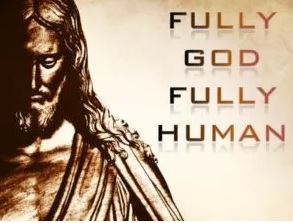
Jesus is the Great Coincidence of Opposites as St. Bonaventure taught. Only the Jesus Paradox gives us the permission and freedom to finally and fully love the paradox that everything already and always will be. (Rohr)
We are not looking to Jesus as a mere example to follow, neither shall we try to idolize him. We see Jesus as the God who takes human form and suffers and weeps with us. (Rohr)
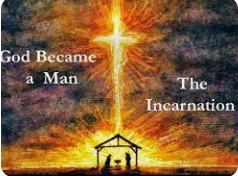
Theology at its best doesn't seek to solve, but to behold. In beholding the mystery of the incarnation in all its depth and subtlety we deepen our intimacy with God. (p83, Healing the Divide)
God became man so that we might become divine.
Freeing Jesus by Diana Butler Bass

Friend: Is mutual. see John 15:15
Teacher / Guru / Rabbi / Sage: parables are mini-mysteries that invite us to struggle with their meanings, to see the world from unexpected angles, to be part of the story by looking into the hidden aspects of our own values and lives(p43-44)
Savior / Messiah: saves us from sin and death [and lost, separation/not whole, unhealthy, suffering, victim, and meaning]; healer/deliverer/rescuer from this world here and now and threatened a world based on fear
Lord / Ruler / Master (one who owns you): paradoxially gives spiritual freedom (p120); the church made him Jesus Caesar (p160)
Way: follow me on a journey/path without destination of self-giving love (p169); the way of interior towards knowing our true self and exterior outward into the world to enact God's justice and love (p186); the journey of awaking which you slowly recognize as your own (p207); the way is full of mystery, paradox, unknowing, and unsaying (p214); step away from certainty and find yourself in a labyrinth of love (p215)
Presence: God is with us, and within us (p233); the Christian faith is not 'seeing is believing,' but rather 'believing is seeing.' We must open our eyes and hearts and see [the Holy Spirit] in our lives. (p245); Mystery - what is disclosed and yet still mysterious (p254); mindful of the quotidian/ordinary presence (p263)
Jesus' Life, Teachings, Death, and Resurrection as 'The Way'
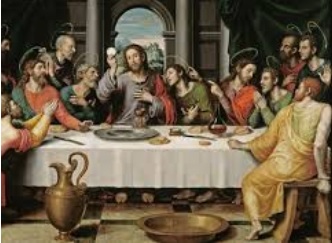
Christianity as a way means that practice, not believing, is central. (p199, Days of Awe and Wonder)
The Traditional church believes that Jesus allowed himself to be unjustly executed by crucifixion, as sacrifice of himself to reconcile humanity to God; this reconciliation is known as the Paschal Mystery.Wikipedia, Catholic Church
The whole purpose of the Christ message is to tell us that through reconciliation the illusion of duality or the isolation brought about by ego ceases to exist as reality.2,p54
The way to oneness was not through informing others of their trespasses, but rather through reconciling them with the spiritual truth of their being. To become whole, we must entertain and understand what appears as duality and reconcile it - not resist, exclude, or ignore it.2,54
Jesus saw the dualistic world all-inclusively. His thoughts were both eminent and transcendent at once.2,57>
Christianity is 'The Way of the Wound'. Jesus agrees to be the Wounded One. We come to God not through our strength but through our weakness. We learn wisdom and come to God not by doing it all right but through doing it all wrong. Until we are enlightened by GRACE, we don’t even see our scapegoating. If we do not transform our pain, we will always transmit it. (Rohr,9/18/20)
On the cross, the veil between the Holy and the unholy is torn and the “curtain of his body” becomes a “living opening” (Hebrews 10:20). We all can enter the Holy of Holies, which is the very heart of God. Nothing changed in heaven on Good Friday, but everything potentially changed on earth! (Rohr,4/2/21)
Jesus agreed to carry the mystery of universal suffering. He allowed it to change him (resurrection) and—it is to be hoped—us, too. Christ frees us from the endless cycle of projecting our pain elsewhere or remaining trapped inside of it. This is the fully resurrected life, the only way to be happy, free, loving, and therefore “saved.” In effect, Jesus was saying, “If I can trust it, you can too.” We are indeed saved by the cross—more than we realize. The people who hold the contradictions and resolve them in themselves are the saviors of the world. They are the only real agents of transformation, reconciliation, and newness. Solidarity with all of life is, in fact, the meaning of life. They agree to embrace the imperfection and even the injustices of our world, allowing these situations to change them from the inside out, which is the only way things are changed anyway. The Gospel is simply the wisdom of those who agree to carry their part of the infinite suffering of God. See Wisdom. (Rohr,5/16/21)
God is doing new things, Jesus proclaimed, but only those with new minds and hearts can see a new world breaking through the cracks of the old.—Ilia Delio, The Hours of the Universe
If evolution is the language of growth and change, then an evolving faith is one that accepts and even embraces change. While the word change normally refers to new beginnings, real transformation happens more often when something falls apart. The pain of something old cracking apart or unraveling invites us to evolve instead of tightening our controls and certitudes. (Rohr,6/3/21)
Look, this is what God is like. [Not only in Jesus, but] stories of a Samaritan hero (Luke 10:25–37), a justified tax collector (Luke 18:9–14), or a father running to welcome his prodigal son (Luke 15:20).
The Way is not a static reality, it is a continually unfolding process. The Christ did not die, but lives still guiding us in wisdom and compassion.9,p39-40
The idea of “Our Father-Friend in heaven” was a revolutionary one, as Jesus, acting as a mediator of divine companionship, collapsed the sacred distance between God and us.(Rohr)
The Golden Rule -
The Greatest Commandment -
Jesus taught with parables and in paradox - see Paradox
Jesus suggests that it is quite unreasonable to assume that God, whose creative activity is expressed even in such details as the hairs of a person’s head, would exclude from God’s concern the life, the vital spirit, of the person’s own self. (Rohr)
The mind of Christ (see 1 Corinthians 2:10–16). That does not mean the person is psychologically or morally perfect, but such a transformed person does see things in a much more expanded and compassionate way. The only thing separating you from such Consciousness is your unwillingness to trust such an utterly free grace, such a completely unmerited gift.(Rohr)
I am the way, the truth, and the life. Except for my showing you the way of God you'd get lost. And with that, Jesus set on his path of suffering. (Freeing Jesus)
The inward journey's only guides are nature, saints, poetry, song, and Spirit. There is no destination, only the enveloping presence of love. (Freeing Jesus)
For St Francis and Clare, Jesus was someone actually to imitate and not just to worship as divine. They saw orthopraxy (correct practice) as a necessary parallel, and maybe even precedent, to verbal orthodoxy (correct teaching). (Rohr)
In John's gospel, Jesus is the new creation. (p274,Mary Magdalene)
Jesus' Third Way was not non-violence nor passitivty, but non-violently standing up for what is right. (p128, Healing the Divide)
No one comes to God except through me (Jesus in John 14:6) is a narrow interpretation of scripture. (p158, Healing the Divide)
Meaning of The Paschal Mystery; the Way of the Cross; the Sign of Jonas; the Divine Paradox
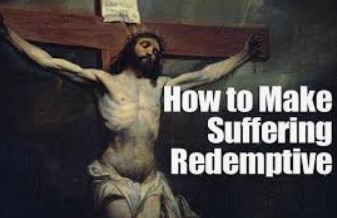
Paschal = pass over = Easter
Redemptive = acting to save someone from error or evil.
There'a a larger story like the paschal mystery that gives transcendent meaning to human suffering.6,p21
The mystery of the rejection, suffering, passion, death, and raising up of Jesus is the interpretative key for what history means and where it is all going. If God is somehow participating in human suffering, instead of just passively tolerating it and observing it, that also changes everything—at least for those who are willing to “gaze” contemplatively. holding the mystery of pain and looking right at it and learning deeply from it, which normally leads to an uncanny and newfound compassion and understanding. (Rohr,5/7/21)
All God appears to want from us is honesty and humility. Western civilization has failed to learn how to carry the shadow side. We did not teach our people how to carry the paschal mystery—with its suffering, death, and resurrection—within ourselves. Christians have little ability to carry the shadow side of themselves, of the church, of history, or of reality itself. It is much easier to see things as all-good or all-bad, rather than both crucified and resurrected at the same time, as Christ is. All of us, it seems, are trying to avoid the mystery in human life, instead of learning how to carry it patiently, as Jesus did. Patience comes from our attempts to hold together an always-mixed reality, not from expecting or demanding a perfect reality. Grateful people emerge in a world rightly defined, where even shadows are no surprise, but, in fact, opportunity for compassion and forgiveness. (Rohr)
But shadowlands are good and necessary teachers. They are not to be avoided, denied, fled, or explained away. They are not even to be forgiven too quickly. (Rohr)
The pattern of transformation Jesus offers is through “the sign of Jonah,” which is the mystery of death and resurrection. Unless we descend, we won’t long for and make inner space for ascent. The paschal mystery is the pattern of transformation, and it indeed is a mystery—that is, it is not logical or rational at all. We are transformed through death and rising, probably many times in our lifetime. For some cosmic reason, there seems to be no better crucible of growth and transformation. We must learn to stay with the pain of life, without answers, without conclusions, and some days without meaning. That is the perilous hidden path of contemplative prayer. Grace leads us to the state of emptiness—to a momentary sense of meaninglessness—in which we ask, “What is it all for?” The spaciousness within the question allows Love to fill and enliven us.(Rohr)
The sign of Jonah as the pattern of death and resurrection that each of us must walk, as Jesus did. Without the sign of Jonah — the pattern of new life only through death. The pain of faith is a treacherous journey of descent that characterizes Jonah, Jeremiah, Job, John the Baptizer, and Jesus. We Christians used the metaphor “the way of the cross,” though unfortunately, it became “what Jesus did to save us”—or a negative theology of atonement—instead of the necessary pattern that is redemptive for all of us. Jesus became the cosmic problem-solver instead of the teacher of the path. (Rohr)
Good Friday, and all Christian life, is about embracing paradox. Jesus’ teachings and his death reveal sacred contradictions.Jesus’ essential paradox—that to lose is to gain and to die is to live—we come to God, who gathers up the broken pieces of the world and makes them more complete and beautiful than they were before they broke. God integrates all fractious dualities into the wholeness of life that Christians call eternal salvation. It’s a life we get to live here and now, by grace and faith. "Unless a grain of wheat falls into the earth and dies, it remains just a single grain; but if it dies, it bears much fruit” (John 12:23b–24). Pay attention to that pivotal "unless" and understand: without the fatal fall, no glorious resurrected life can be lived. Denying pain would intensify it, but facing hard facts of life and death would lead people deep into reality, the only place where God eternal can be found. (Rohr)
The Second Coming of Christ (Consciousness)

Through the practice of meditation, the faithful student is enabled to realize the fulfillment of Jesus' promise to send the Holy Spirit / Great Comforter by expanding one's consciousness to receive within the Christ consciousness. (p263,Man's Erernal Quest)
see Resurrection
Revelation - Heaven on Earth
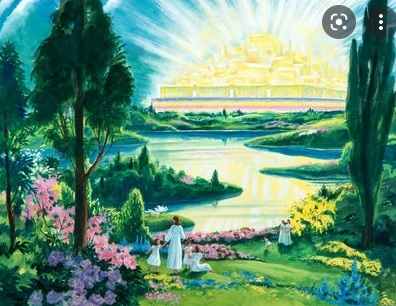
CAC teacher Brian McLaren, who illustrates how one of the Bible’s most challenging books—Revelation—can be a source of wisdom and hope for us today:
There’s a beautiful visionary scene at the end of the Book of Revelation that is as relevant today as it was in the first century. It doesn’t picture us being evacuated from Earth to heaven as many assume. It pictures a New Jerusalem descending from heaven to Earth [see Revelation, chapter 21]. This new city doesn’t need a temple because God’s presence is felt everywhere. It doesn’t need sun or moon because the light of Christ illuminates it from within. Its gates are never shut, and it welcomes people from around the world to receive the treasures it offers and bring the treasures they can offer. From the center of the city, from God’s own throne, a river flows—a river of life or aliveness. Along its banks grows the Tree of Life. All of this, of course, evokes the original creation story and echoes God’s own words in Revelation: “Behold! I’m making all things new!”
Rather than giving its original readers and hearers a coded blueprint of the future, Revelation gave them visionary insight into their present situation. It told them that the story of God’s work in history has never been about escaping Earth and going up to heaven. It has always been about God descending to dwell among us. . . . God wasn’t a distant, terrifying monster waiting for vengeance at the end of the universe. God was descending among us here and now, making the tree of true aliveness available for all.
Earlier in the year, Richard shared the shocking hopefulness of the Bible’s apocalyptic literature: God puts us in a world of passing things where everything changes and nothing remains the same. The only thing that doesn’t change is change itself. It’s a hard lesson to learn. It helps us appreciate that everything is a gift. We didn’t create it. We don’t deserve it. It will not last, but while we breathe it in, we can enjoy it, and know that it is another moment of God, another moment of life. People who take this moment seriously take every moment seriously, and those are the people who are ready for heaven.
Brian offers this final encouragement: What was true for Revelation’s original audience is true for us today. Whatever madman is in power, whatever chaos is breaking out, whatever danger threatens, the river of life is flowing now. The Tree of Life is bearing fruit now. True aliveness is available now. That’s why Revelation ends with the sound of a single word echoing through the universe. That word is not Wait! Nor is it Not Yet! or Someday! It is a word of invitation, welcome, reception, hospitality, and possibility. It is a word not of ending, but of new beginning. That one word is Come! The Spirit says it to us. We echo it back. Together with the Spirit, we say it to everyone who is willing. Come! (Rohr 12/31/21)
We often believe that heaven is a giant courtroom scene. The good people win, the bad people lose, and almost everybody is bad except our group. But we forget the good news of Jesus, sending a message out to the highways and the byways, inviting everybody who’s willing to come to the banquet. No one wants seems to want this gift. We’d rather have religion, and laws, and commandments, and obligations, and duties. I’m sure many of us attend church out of duty, but gathering with the Body of Christ is supposed to be a wedding feast. In the four Gospels eternal life is described as a banquet, a feast, a party, a wedding, the marriage feast of the Lamb. (Rohr)
Saved from Self by Grace
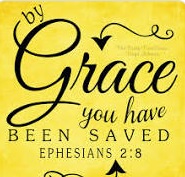
By grace you have been saved.” (Ephesians 2:8) It’s not by what you do that you earn God’s love. God embraces you as you are—by grace. And it has already happened. (Rohr,6/16/21)
A mature believer knows that it is impossible not to be connected to the Source, or not to be “on the vine,” as Jesus says. But most people are not consciously there yet. They are not “saved” from themselves, which is the only thing we really need to be saved from. (Rohr)
The Sacraments
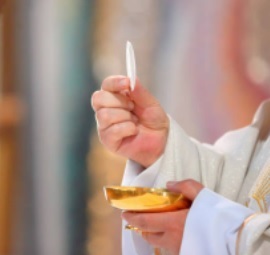
The word sacrament is derived from a Latin phrase which means “to make holy.” When hit with the glint of love’s light, even ordinary things become holy. (Rohr)
When Jesus spoke the words “This is my Body,” I believe he was speaking not just about the bread right in front of him, but about the whole universe, about every thing that is physical, material, and yet also spirit-filled - as the pattern of every thing, and not just this thing. The bread and wine are largely understood as an exclusive presence, when in fact their full function is to communicate a truly inclusive—and always shocking—presence. The universe is the Body of God, both in its essence and in its suffering.(Rohr)
God’s Presence can be seen in the ordinary and the material, and we do not have to wait for supernatural apparitions. We Catholics call this a sacramental theology, where the visible and tactile are the primary doorway to the invisible.(Rohr)
The core message of the incarnation of God in Jesus is that the Divine Presence is here, in us and in all of creation, and not only “over there” in some far-off realm. (Rohr)
The sacramental principle is this: Begin with a concrete moment of encounter, based in this physical world, and the soul universalizes from there, so that what is true here becomes true everywhere else too. And so the spiritual journey proceeds with ever-greater circles of inclusion into the One Holy Mystery! But it always starts with what many wisely call the “scandal of the particular.” It is there that we must surrender, even if the object itself seems more than a bit unworthy of our awe, trust, or surrender. The purest form of spirituality is to find God in what is right in front of you—the ability to accept the sacrament of the present moment.(Rohr)
Repent: Change Ones Mind and Ways

Repent is the Greek word metanoata which means 'to go beyond the mind that you have' - from coventional wisdom (individualism, politics and society/culture) to the alternate wisdom of Jesus (compassion and social justice). From being blinded by the ordinary to minds and hearts centered in the Spirit, alive to wonder, alive to seeing and having compassion. (Days of Awe and Wonder by Marcus Borg, p128-9)
The meaning of the Hebrew word for repentance is return: to return from exile, to return from the state of separarion to a new self in God. (p235, Days of Awe and Wonder)
East - West Schism
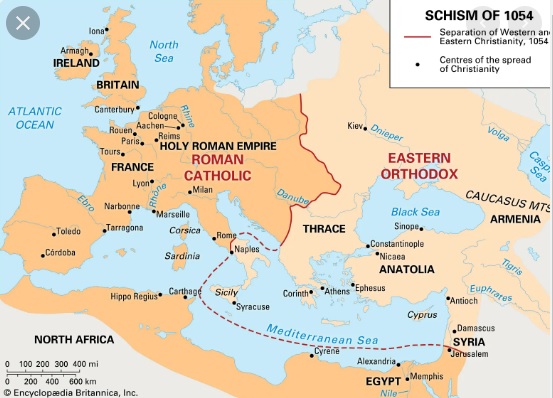
Also known as the Great Schism or Schism of 1054 was the break of communion which occurred in the 11th century between the Roman Catholic Church and Eastern Greek Orthodox Church.
Besides language, governance, and politcal issues, there were the following theological differences:
Trinity - Roman: 'and from the Son', Orthodox:'God from God'
Eucharist: Roman: transsubstantiation, Orthodox: Christ's Body is not phyical flesh
Mind (reason, rationality) is the focus of Western theology, whereas, in Eastern theology, the mind must be put in the heart,
In the East a person cannot be a true theologian or teach the knowledge of God, without having experienced God
Original Sin -
Immaculate Conception -
Purgatory -
Damnation/Hell -
Church History and Dogma
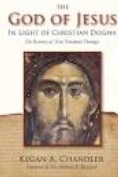
33 - Paul hinted at the secret teachings of Gnostics, but thought the masses were not yet able to understand and therefore needed laws that they could follow, thus losing Jesus' transcendental consciousness and its message of us as divine beings with a body. In explaining that Jesus and God were one and the same, he did it in a way that excluded the rest of humankind.2,p30-31
100s - Gnostics claimed Jesus to be merely a human who attained divinity through gnosis and taught his disciples to do the same.
325 - Council of Nicea gave the Christian church power and authority and it condemned Gnosticism as heresy
381 - First Council of Constantinople further developed Trinity
412 - St. Augustine concept that a state of "Original Sin" existed since the Fall
1226 - St. Francis believed that Jesus' death was not penalty for sin. No atonement is necessary. There was no bill to be paid; there was simply a union to be named.
Jesus did not come to change the mind of God about humanity. It did not need changing. Jesus came to change the mind of humanity about God! God is not someone to be afraid of but is the Ground of Being and on our side.
The Franciscan minority position, our alternative orthodoxy, is basically saying that no atonement is necessary. Some call it “at-one-ment” instead of atonement. There is no bill to be paid; there is simply a union to be named. Jesus didn’t come to solve a problem; he came to reveal the true nature of God as Love.
1266-1308 - John Duns Scotus claimed that instead of a “necessary sacrifice,” the cross was a freely chosen revelation of Total Love on God’s part. The cross, instead of being a transaction, was seen as a dramatic demonstration of God’s outpouring love, meant to utterly shock the heart and turn it back toward trust and love of the Creator.
1945 - Discovery of the gnostic gospels found at Nag Hammadi, best known was the Gospel of Thomas
1962 - Vatican II revised ecumenical efforts towards dialog with other releigions and universal call to holiness
Christian Saints
St Augustine of Hippo (354-430)
St Benedict of Nursia (480-547)
St Dominic de Guzman (1170-1221)
St Francis of Assisi (1181-1226)
St Bonaventure's (1221-1274) three great truths:
Emanation: We come forth from God bearing the divine image, and thus our inherent identity is grounded in the life of God from the beginning (Genesis 1:26–27).
Exemplarism: Everything, the entire chain of being, and everything in creation is an example and illustration of the one God mystery in space and time (Romans 1:20). No exceptions.
Consummation: All returns to the Source from which it came (John 14:3). The Omega is the same as the Alpha and this is God’s supreme and final victory.
St Thomas Aquinas (1225-1274)
St Catherine of Siena (1347-1380)
St Agnatius of Loyola (1491-1556)
Spiritual Excercises - To Find God in All Things:
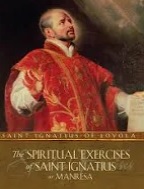
First Week: Sin, and God's mercy
Second Week: Episodes in the life of Jesus
Third Week: The passion of Jesus
Fourth Week: The resurrection of Jesus, and Contemplation on God's love
St Teresa of Avila (1515-1582)
St John of the Cross (1542-1591)
St Theresa of Lisieux (1873-1897)
Popular Christian Books
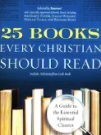
The Imitation of Christ by Thomas à Kempis: doing whatever it took to imitate his Savior, Jesus Christ.
Mere Christianity by C.S. Lewis: explores the “common ground upon which all of those of Christian faith stand together.”
The Confessions of St. Augustine: more than just an autobiography. He traces different cross-roads in his life, such as his lavish time at the imperial court, his sexual struggles, his resulting renunciation of marriage and ambition, and his final return to his Catholic faith to inspire his followers to seek their own personal growth.
Knowing God by J.I. Packer: explains who God is and also shares how we can relate to him, the different attributes of God, and the benefits of knowing him closely.
More Than a Carpenter by Josh McDowell: a former skeptic who examined the evidence about Jesus.
The Practice of the Presence of God by Brother Lawrence: a monk who discovered the secret of practicing God’s presence even in the midst of mundane tasks.
The Purpose Driven Life by Rick Warren: focuses on equipping a new generation of Christians to discover God’s purpose for their lives.
Interior Castle by Teresa of Avila:
The Brothers Karamazov by Fyodor Dostoevsky:
Paradise Lost by John Milton:
Divine Comedy by Dante Alighieri:
The Cloud of Unknowing by Unknown
The Seven Storey Mountain by Thomas Merton:
Dark Night of the Soul by John of the Cross:
Orthodoxy by G.K.Chesterton:
On the Incarnation by Athanasius of Alexandria:
Resurrection

The message of the Gospels is the message of a new creation in the midst of an old. This act of God is a spiritual resurrection. (p43,God's Pursuit of Man)
Resurrection and renewal are, in fact, the universal and observable pattern of everything. If incarnation is real, and Spirit has inhabited matter from the beginning, then resurrection in multitudinous forms is to be fully expected. The Christ Mystery anoints all physical matter with eternal purpose from the very beginning. If God inhabits matter, then we can naturally believe in the “resurrection” of the body. “Resurrection” is another word for change, but particularly positive change—which we tend to see only in the long run. In the short run, it often just looks like death. Jesus is the microcosm for the whole cosmos, or the map of the whole journey. (Rohr)
Resurrection for us, in the context of the new universe story, is a transformation in consciousness, an experience of transcendence in which we live out of the connectedness that is our truth. Even little resurrections that come after choosing to die to fear and egocentricity release the Spirit. Life and death are a single mystery. That is what the Paschal Mystery teaches us. Death is inevitable—but so is resurrection. This is what Easter means in the experience of the [human] race. Resurrection is the announcement that life cannot ultimately be conquered by death. Be awake and watchful for the resurrections, for the creative ways that new life streams into our lives even in the midst of death. (Rohr)
For the Gospel of John, eternal life is not only about life after death, it's also a quality of life here and now. (John 17:3) (p96, Healing the Divide)
Kingdom of God
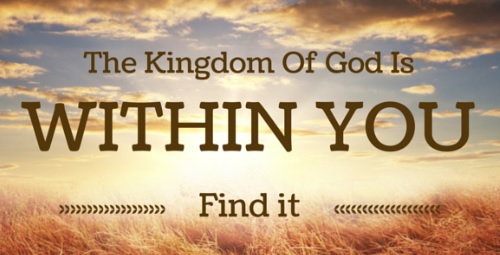
When we enter the kingdom of God it is different from and mostly it is contrary to the old. (p47,God's Pursuit of Man)
It's as though material prosperity blinds us to the simple pleasures of life and to the blessing of close-knit community. The poor have often found the key to abundant life. - not material gain, rather thriving on simple pleasures and enduring relationships. (p138, Healing the Divide)